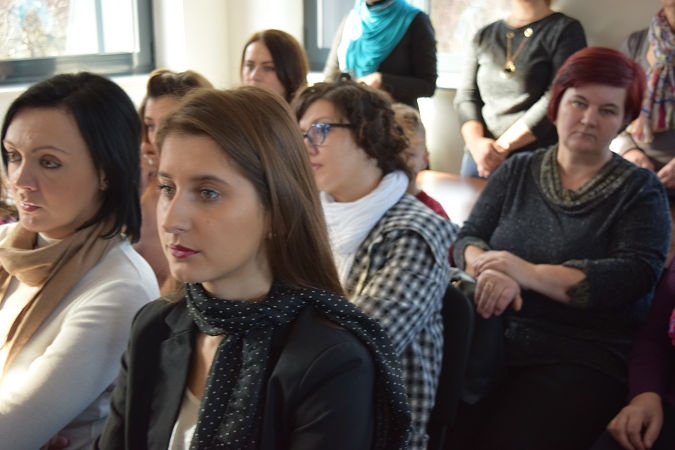Civil society supports women to live a life free of violence in Bosnia and Herzegovina
Date:

Women activists discuss how to improve access to services for survivors of domestic violence in Bosnia and Herzegovina. Photo: Courtesy of Foundation of Local Democracy
According to the latest report of the committee on the elimination of all forms of discrimination against women (CEDAW) [1] for Bosnia and Herzegovina, violence against women and girls continues to be widespread in the country. Further, it is often seen as a socially acceptable behaviour.
Through the country-level component of the Implementing Norms, Changing Minds regional programme, UN Women Bosnia and Herzegovina is partnering with a number of civil society organizations with the aim of ensuring that all women can live a life free of violence. For the next two years, these organizations will address the inequalities that lie at the intersection of gender and other factors such as age, disability, socioeconomic status, ethnicity and nationality.
Since its 1998 establishment, the Lara Foundation (from Bijeljina, in north-east Bosnia and Herzegovina) has been at the forefront of combating violence against women and girls, ensuring safe spaces for survivors, advocating for women’s rights and empowering women.
Their initiative under the regional programme is designed to train service providers in applying international standards for protecting women from violence. According to the Lara Foundation Director, Radmila Žigić, “we prioritize preventing violence against women. Laws are not good enough, they are not implemented, and there are no resources to enforce them.”
A non-governmental organization established in 1996 in Banja Luka, the United Women Foundation aims to improve women’s social position and their right to live free from violence in private and public life.
Under the regional programme, the United Women Foundation is training women activists from grass-roots organizations who work with or represent minority and disadvantaged groups. The overarching aim is to raise awareness of international standards for protecting women’s rights as established by CEDAW and the Istanbul Convention (the Council of Europe Convention on preventing and combating violence against women and domestic violence).
“Our objective is to strengthen women’s voices in advocacy for harmonization of the laws and public policies in Bosnia and Herzegovina with the key international standards that are obligatory. Women grass-roots activists know it is important that we work together to make a greater impact on improving the lives of women throughout the country,” says Aleksandra Petrić, United Women Foundation's Executive Director.
With significant experience in initiatives that protect survivors of gender-based violence, the Foundation of Local Democracy has over 20 years of experience in human rights projects and programmes.
In the context of the regional programme, the Foundation of Local Democracy is coordinating the Safe Network project. The project works with women’s non-governmental organizations and organizations managing shelters in order to improve access to services for women and girls who survived domestic violence in Bosnia and Herzegovina. The Safe Network project is developing a policy paper based on an overview of current gaps in primary and secondary regulations. The paper will make recommendations that will outline an adequate legal framework for the establishment, functioning and financing of safe houses. The project is expected to formulate and advocate for the main reforms that need to be implemented.
Expanding on the project’s goals, Amra Hadžić (Programme Manager at the Foundation for Local Democracy), said “based on the Policy paper, the Safe Network will offer concrete proposals to the governments of the Federation [Bosnia and Herzegovina] and Republika Srpska. The Safe Network will additionally support this effort with a strong advocacy campaign aimed at creating a favourable environment for the adoption of the developed and offered solution.”
[1] Concluding observations on the combined fourth and fifth periodic reports of Bosnia and Herzegovina, http://arsbih.gov.ba/wp-content/uploads/2014/02/CEDAW_4-5.pdf